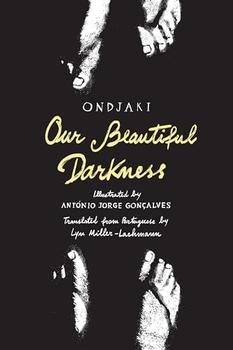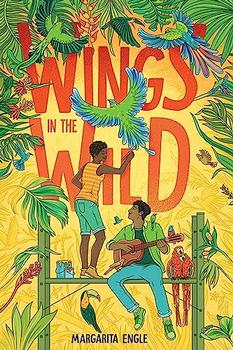Summary | Excerpt | Reviews | Beyond the book | Read-Alikes | Genres & Themes | Author Bio

A Graphic Novel
by Ondjaki, Lyn Miller-LachmannThe slight narrative of the poet Ondjaki's new graphic novel, Our Beautiful Darkness, consists of a single conversation between two unnamed teenagers in 1990s Luanda, the capital of Angola. Plunged into darkness during a neighborhood blackout, the pair—a boy and a girl—feel emboldened to open to each other, bit by bit. There is a familiarity and chemistry between the two, and the excitement of reciprocated feelings:
Her fingers danced quickly, rhythmically across
my hand: a gesture of tenderness to soothe my nerves,
or calm her own.
After all, a person can also say things without using
their voice.
As the promise of a first kiss builds between them, they ask questions of each other and share stories, some real and some imagined, content to simply revel in this moment of quiet intimacy.
As this may suggest, Our Beautiful Darkness is light on plot—it is structured like an extended prose poem, and the focus is far more on creating a distinct atmosphere. It takes place at the tail end of the decadeslong civil war that caused devastation across the author's native Angola. Though this context is thematically important, making the young characters' search for love and human connection even more moving, it isn't explicitly discussed in the text (the translator's note at the end provides the historical context for international readers who may not be aware of it). Within the characters' conversation, this backdrop of civil war is only referenced in passing: the girl mentions the death of her father in the conflict, and the boy alludes to having witnessed scenes of violence.
Ondjaki's choice to have the characters speak around the war, but rarely of it, deepens our understanding of these characters and their world. It is indicative of just how ingrained the conflict has become in people's day-to-day lives, while also hinting at the need for respite from violence and fear. It feels as though the characters are deliberately pushing it from their minds for the night, allowing themselves a moment of calm amidst the storm, as though the blanket of darkness is both literally and metaphorically obscuring the turmoil of the outside world.
Ondjaki's language is simple, with not a word feeling wasted, and it is all the more evocative for it. His poetry feeds into the lilting, dreamlike quality of his fiction, as when the boy describes the blackout:
Suddenly the lights went out.
In this darkness of sweet melody or warm silence,
between the buzz of mosquitoes and the whiff of
a match lighting the first candle inside my house,
I found the courage to speak.
There is a whimsy to his writing that Lyn Miller-Lachmann's translation from the Portuguese has kept intact. That said, even in the context of Ondjaki's delicate verse, the story can err towards the saccharine at times, with dialogue that feels unnatural, such as in the following exchange
"What do you think can fit in a person's heart?"
"A poem, a memory, a smell from childhood, star-wishes," she replied.
If you can suspend your disbelief somewhat in that regard, Our Beautiful Darkness is a singular, heartfelt offering that captures a quiet moment in time and celebrates its beauty.
Though billed as a graphic novel, Our Beautiful Darkness reads more like a short story or novelette that has been fully illustrated. You won't find any of the traditional grids, paneled layouts, or text bubbles of most graphic novels or comics. Instead, António Jorge Gonçalves' energetic illustrations streak their way across each page or double spread in an abstract, expressive way. As with the prose, the art is minimalist in style yet bold in execution. Constructed entirely in white against a black background, the artwork serves as a perfect visual embodiment of the story's core theme of finding light in the dark.
![]() This review
first ran in the July 31, 2024
issue of BookBrowse Recommends.
This review
first ran in the July 31, 2024
issue of BookBrowse Recommends.

If you liked Our Beautiful Darkness, try these:

by Jacqueline Woodson
Published 2025
Winner: BookBrowse YA Book Award 2023
National Book Award winner Jacqueline Woodson brings readers a powerful story that delves deeply into life's burning questions about time and memory and what we take with us into the future.

by Margarita Engle
Published 2024
This gorgeously romantic contemporary novel-in-verse from award-winning author Margarita Engle tells the inspiring love story of two teens fighting for climate action and human rights.
Your guide toexceptional books
BookBrowse seeks out and recommends the best in contemporary fiction and nonfiction—books that not only engage and entertain but also deepen our understanding of ourselves and the world around us.